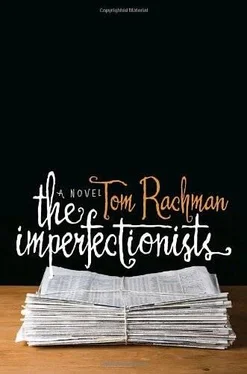She sits back. She leans forward, then sits back again. "Well." She takes another sip of her cocktail.
"Not drift back into anything like before, I mean. Is that…? What do you think?"
"This thing is cloying, has a cloying taste. It's too sweet." She puts down the straw. "Yes, I completely agree. I was about to say that myself." She looks around the room. The jazz band is too loud. She takes another sip. "Hmm."
"What's the hmming for?"
"No, nothing." She pauses. "How come, though? I mean, I agree-I'm not trying to change your mind. But I'm kind of confused. A few days ago, if I'm not mistaken, you wanted to have sex with me in your office."
"No, I didn't."
She gapes at him. "Did that not happen? Was I hallucinating?"
"Nothing more was going to happen."
"It almost did happen, Dario."
"It didn't. It wouldn't have."
"Oh, come on."
"It wouldn't have happened," he insists. "I'm not attracted to you anymore."
"How do you mean?" It's perfectly clear what he means, but she is prevaricating until she can compose herself.
"I'm not sexually attracted to you anymore," he says. "I don't mean to be harsh."
She flips her hair aside. "Evidently I need to start dyeing out the gray."
"It's not age."
"Yes, right-Ruby's older than me and age never stopped you with her."
"I told you, with you it's like you're the aggressor. And I don't understand you sometimes. Even in my office, you seemed eager but then, when I responded, you just went away."
"You're fixated on how things used to be between us. But we agreed that we wouldn't revert to our old habits, no? And I'm not like that anymore, if I ever was."
He drinks the last of his wine; her cocktail is gone, too. But neither is ready to leave. This encounter has been so sour.
"Another drink?"
"I'd have another."
He catches her smiling. "What? What's funny?"
"Us. We had my dumb honesty session before-it was supposed to get rid of all my bad habits! But instead." She shakes her head. "You really are smart, you know. I haven't given you enough credit." She runs her forefinger down the bridge of his nose.
"I know you haven't."
She holds her head in her hands, peeking theatrically through her knitted fingers. "I sound so awful when you describe me. And I can't even disagree. Well, I can. But not honestly."
He shifts his stool closer and, as her face emerges, he strokes her hair. He touches her forehead. "You," he says. "You again. You're still dear to me. You are goodness." He smiles. "I told you that before."
She shifts away. "What," she says hurriedly. "What are you talking about?"
"You-you're so driven. Like a mole burrowing in the earth, just pushing ahead. But I remember you." He smiles. "I remember you waking up. You sleeping. You getting the hiccups at the movie theater."
She can't talk.
"But it makes me sad," he concludes. "You make me sad a bit. I still love you, but we're not going to start anything."
Her eyes well up. Quietly, she says, "Thank you." She wipes her nose. "When I'm old and bent and sitting in a chair, you come and hold my hand. All right? That's your job. Okay?"
He takes her hand and kisses it. "No," he says. "When you're old and bent, I'll be gone. I'll hold it now. Later, you'll have to remember."
1962. CORSO VITTORIO, ROME
Newsroom noises drifted into Betty's office: guffaws and murmured gossip, the clack and bing of typewriters, copyboys emptying crystal ashtrays into the garbage can. She sat at her desk, unable to work, spirits sunk beyond all reason.
Ridiculous-that's how she felt. Absolutely laughable. She had no right to be mourning still. To have cultivated the notion that she and Ott had a particular bond. Looking at paintings together. But what about the old days in New York?
Everyone felt this way about Ott, she supposed-this amplified sense of their importance in his life. He had that effect. His attention had been a spotlight; all else dimmed.
However, she had exerted no such force on him. He had left her in New York, had gone back to Atlanta, pursued his life of profit and expansion. He had married, produced a son. Betty should have forgotten about him; his absence shouldn't have mattered as much as it had and for as long. Eventually, she moved away from New York, traveling to Europe to report on Hitler's war. In London, she met a fellow American reporter, Leo, and they married. After the war, they settled in Rome, she consuming more Campari than she'd imagined the first time she tasted the stuff, writing less than she'd planned, too.
Then Ott had turned up, his presence at once magnifying all the small compromises she had made over the years, while offering an escape from them. She wanted to write again and believed she could. He installed her as the voice of the paper. Leo had the title of editor-in-chief, but everyone knew she was the brains of the operation. She came back to life with Ott across the newsroom. But outside the paper?
Ott had never sought to resume anything with her. Their outings to buy paintings, their lunches at his mansion-meaningless. Look, she reminded herself, he never even told me he was sick. He never asked for help. He never contacted me when he was dying. I didn't have that role in his life. I have no right to this grief.
One night, when Leo was out boozing with the staff, Betty took a taxi up to the Aventine Hill and stood before the spiked fence surrounding Ott's old mansion. Nothing remained in there. Only the paintings they had collected together: the swan-necked Gypsy by Modigliani; Leger's wine bottles and bowler hats; the acrobatic blue chickens and emerald fiddlers by Chagall; Pissarro's cozy English parsonage, smoke twisting out the chimney; the sloshing shipwreck of Turner-all of them, hanging in the pointless dark. She held down the buzzer, ringing the empty house, knowing it to be futile yet pressing till her fingertip went bloodless white. She let go; the house fell silent.
Without Ott around, Betty and Leo diverged more and more on how to run the paper. They hid their discord at the office, but barely. So it was with trepidation that they greeted news of a visitor from headquarters in Atlanta: Ott's son, Boyd, who was to pass the summer of 1962 in Rome before starting his junior year at Yale.
Leo, eager to curry favor, lined up a series of glitzy events to impress the young man and dispatched cleaners to dust off the old mansion on the Aventine Hill.
As a teenager, Boyd had flown to Rome each summer to spend a few weeks with his father. The pinnacle of those visits came when he and his father spoke alone. Even Ott's most cursory remarks entered Boyd as purest fact, as certain as the planets. When each vacation drew to an end, Boyd yearned to stay, to quit school in Atlanta, to live in Rome with his father. But Ott never invited him. On the flight home, the teenager mocked himself mercilessly, recalling his errant remarks, stinging at the memory, deeming himself an idiot, a disgrace.
Now, two years after his father's death, Boyd had returned to the city, a young man. To everyone's surprise, he spurned Ott's old mansion in favor of a hotel. And he showed no interest in carousing with Leo and the staff. Boyd disdained alcohol, disliked food, and betrayed no sense of humor. His goal in Rome, he said, was to learn the business of newspapering. But he seemed more interested in learning the business of Ott. "What did my father think about this?" he asked. "And what did he say about that? What was his plan for the paper?"
"The kid strikes me as sort of angry," Betty remarked. "Do you get that at all?"
"Well, I happen to like him," Leo responded, almost scolding.
"That wasn't what I was saying."
Not until Boyd returned to Atlanta did Betty and Leo separate. She liked to say, "I got the record player, he got the paper."
Читать дальше












